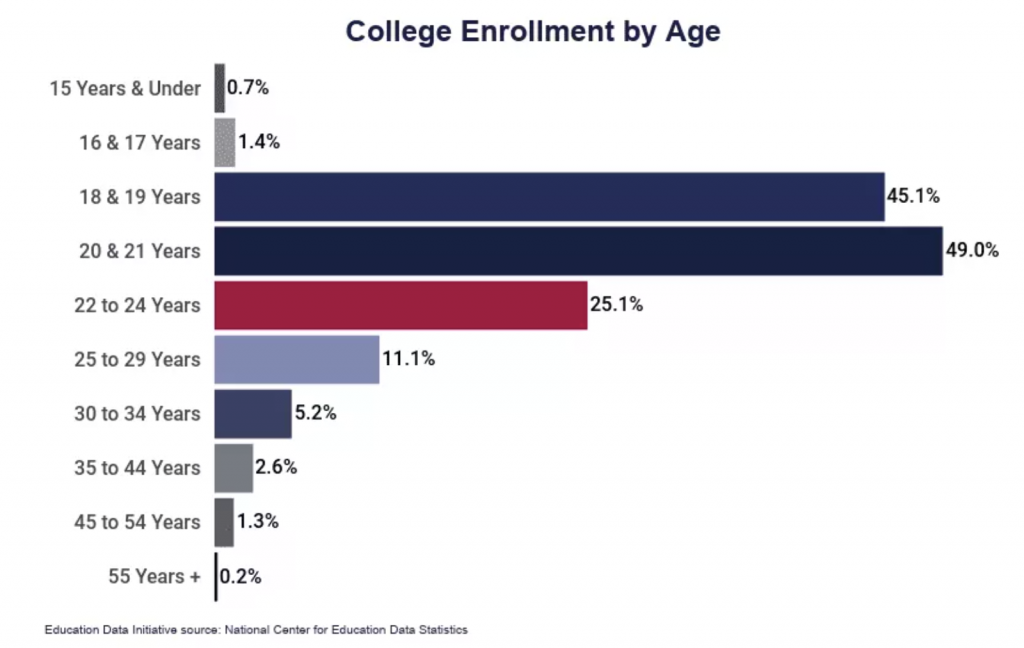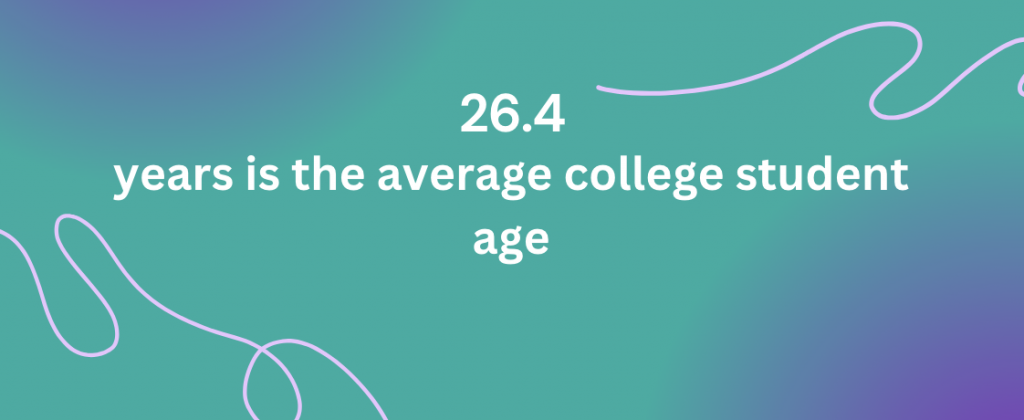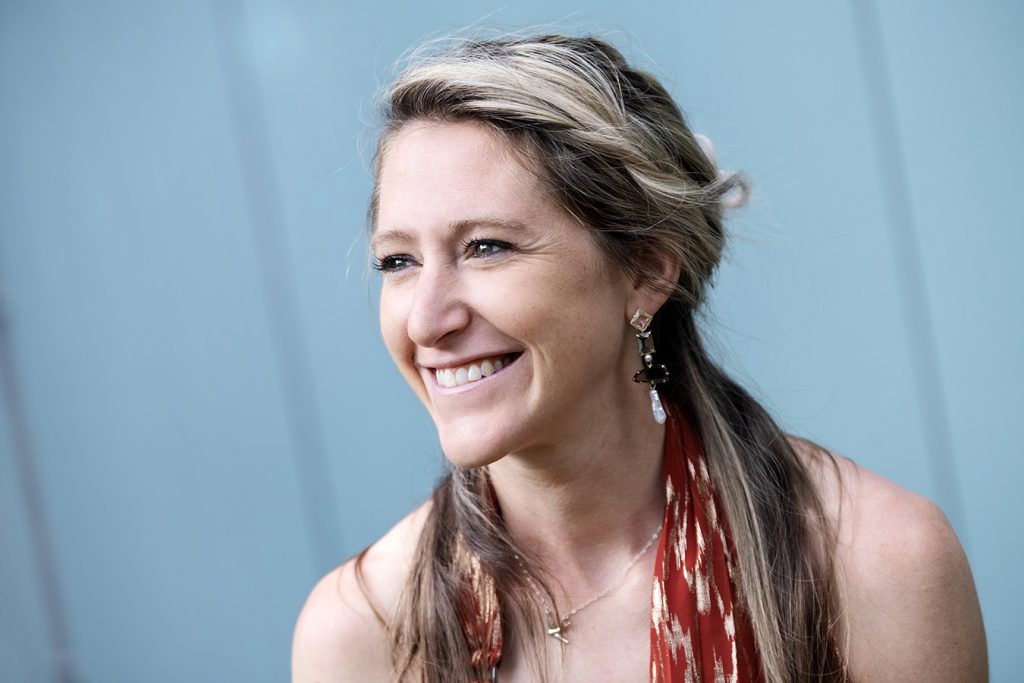Hello everyone! It’s me again. Although we live in a modern society, a lot of people still believe that once you’re no longer a teenager, having a higher education degree is useless, which is entirely not true and even damaging. I think that it’s better to always be learning and improving your knowledge, and in many cases, getting a formal education is the most suitable choice for your life objectives. I’m 34, and I’m considering starting formal learning to promote my career. I invite you on a short ride with me. In this review, I will write about my own experiences and share a few tips about how to go back to school as an adult.
Non-Traditional College Students: Hard Facts
Today’s society shows that the number of people who want to go back to school at an older age is growing larger with the growing realization of its benefits. In fact, the international trends are now quite positive.
If you’ve been thinking, “Is it ever too late to go to college?”, you’d be surprised to learn that a 96-year-old man earned his college degree in Palermo in 2020, graduating as the top-rated student and becoming Italy’s oldest student.
One of the reasons for this is that many people today have a better quality of life and can afford going to college as an adult after the turbulent and difficult 20th century.
Although we associate learning with the typical “go to college after high school” thing, there are many non-traditional students who earn their degree.
The choice of whether to pursue on-campus or online ways of earning a degree depends on many factors, but online learning is becoming more and more popular. Online learning institutions have more than 70% of non-traditional students, and almost half of the entire learning population is employed full-time. However, there’s one particularly saddening statistic about going to college at 25 and later; only 33.7% of non-traditional students have earned their degrees, compared to 54.1% of the traditional ones.
As people age, it is typically less expected of them to go back to school. For example, according to recent statistics, 6.95% of Americans aged 25 to 29, 4.19% of 30- to 34-year-olds, 2.83% of 35- to 39-year-olds, 1.69% of 40- to 49-year-olds, and just 0.54% of people between 50 and 64 are enrolled in college or university today. Still, that’s better than none, right?
My Worries About Starting Late: Everyone’s Afraid
I’ve never been the best with theoretical concepts; my work buddies also always say that starting college is not necessary for those who already have a decent job. As a supervisor of cashiers, I had a lot of reservations about this endeavor as well. Here are some of the reasons that put a strain on my idea of becoming a returning adult student.
- Excessive difficulties in jumbling work and college. Starting college at 25 or later has always seemed like a difficult task for me to handle. People after high school usually don’t have to work full-time or even work at all if they’re lucky enough to have families financially providing for them. Considering that I have a demanding job that is stressful enough to make me sometimes fall asleep immediately after I come home, I’ve thought about this issue as being the main one.
- Additional expenditures. Although it is possible to request tuition help, I’ve been putting some money aside to go back to college and be on the safe side. I don’t think people should expect tuition as a guarantee because there’s always something that can go wrong. I didn’t want to spend more money on something that would put a strain on my budget.
- Potential family issues. I am a dad and a husband, and I hope that I’m a good one. My wife has never stated anything discouraging about me returning to school, but I was afraid that I would become an absent husband and father. Studying is exhausting, but doing so with a child crying in the middle of the night? Even more stressful.
- Going back to school in your 30s is shameful. I know that it doesn’t sound like that big of a deal, but I’ve always thought that people could do something better than going back to school at 30 or later. It didn’t seem particularly practical or useful for me when I already had a job. I imagined myself surrounded by teenagers who’ve barely gone through their first serious conflicts with their parents and finding no common ground with them. Imagining the awkward feeling in the class or making mistakes in front of those who would just be entry-level workers in my workplace somehow didn’t appeal to me. I should admit that it’s a pretty unfair thing to say, but I want to be honest.
The Advantages of Starting College Late
Despite my reservations about starting college at 30, I realized that there are many benefits to going to college as an adult. Here are the ones that did it for me.
- More confidence. Let’s be honest; people who start school early are teens, which is completely normal. However, when a person thinks about going back to college at 25 or older, they’re an adult with experience and knowledge of what they want. Many things that typically make a younger individual worried are not as significant to an older student. In some ways, it can make you more separate from the crowd, but you’ll feel more comfortable around everyone.
- The ability to switch careers. Is it too late to go to college again if you already have a diploma? No, it is never late. Even more, going back to school as an adult allows you to find a new professional path for yourself. One of my best friends majored in education when she was younger, but recently, she has realized that she wants to be a pilot. She is almost 30 now, so that counts for something, doesn’t it? A lot of students do not realize that what age do you go to college also influences the perception of your life goals. A lot of people just choose the thing that they find the easiest or that their parents want them to pursue. When starting college at 40, people know what they want much better.
- Better wages. My primary objective in going to college is to increase my salary in the long-term perspective. People with higher education almost always have better income than those with a high-school diploma.
- Better specialization. Even if you’ve already gained some type of education, you can start again to improve your knowledge, get better specialization, or increase your professionalism. For example, if you’ve got a Bachelor’s degree but want a Master’s, it’s a good idea to start learning again.
- A more mature personality. I’m pretty sure that people should stop thinking, “What age do you go to college?” and instead focus on the benefits that they can achieve. As I’m now in my 30th year, I realize that we live in a culture that views people over 25 as those who cannot learn anything new and should have their lives cemented. In reality, your age only gives you more leverage and psychological stability, which can help you study. You won’t make many of the mistakes that you might’ve as an adolescent. You have your priorities now.
How to Start College in Your 30s
I hope that you’re no longer thinking, “Is it ever too late to go to college?” and instead asking other questions like “How to go back to school?” While I can’t tell you about the best degrees for 30 year olds or anything like that because only you can decide what’s best for you, I have some suggestions for you to try.
Step 1. Choose your focus. It’s important to make it through the phase of asking “Is it too late to go to college?” and accept your right to get such an experience. After that, think about what you expect from your degree. Do you want a different path in the world? Do you hope to get more money? Are you bored? It may be tempting to skip this part, but don’t.
Step 2. Choose your major. Based on your goal, you can now pick a major. I don’t believe that some majors are better than others; it all depends on your goals. But if you simply want to get the experience of formal learning, I’d suggest going for something you find enjoyable.
Step 3. Consider finances. This aspect was the most challenging for me; I was not sure that I could get tuition, so I saved money to pay for my studies. I dislike the idea of being in debt. Even more, it terrifies me. However, you can apply for tuition through Free Application for Federal Student Aid. Another option is if you want to increase your degree of professionalism; ask your employer to cover some of the costs; they may even be happy to do so because they will have a more experienced and loyal employee. If you have a particular university in mind, write to them and ask about grant and scholarships possibilities.
Step 4. Send your applications to the chosen schools. Most of the time, your application process will be the same as that of other students, but every school can have its own demands. It is now becoming more popular, so you can actually get even more support.
Step 5. Find communities. If you want to feel less alone, inquire about the freshman age in the chosen institution. Try to find out if there are any other adult learners in the college if it matters to you. Look for clubs that interest you if you have some time to spare.
Step 6. Choose a model that can be combined with your life. Not everyone can afford offline education, so perhaps online or hybrid learning is better for you. Don’t underestimate the time you will spend on this issue. In most cases, you will need to work harder than before, so adapt it to your needs.
Concluding Remarks
Regardless of your goals, don’t allow yourself to get discouraged by those who spread misinformation about “being too old” for something. It’s never too late to learn, so don’t give up on yourself. You deserve to learn, discover new things, and make your life better, so go for it!







